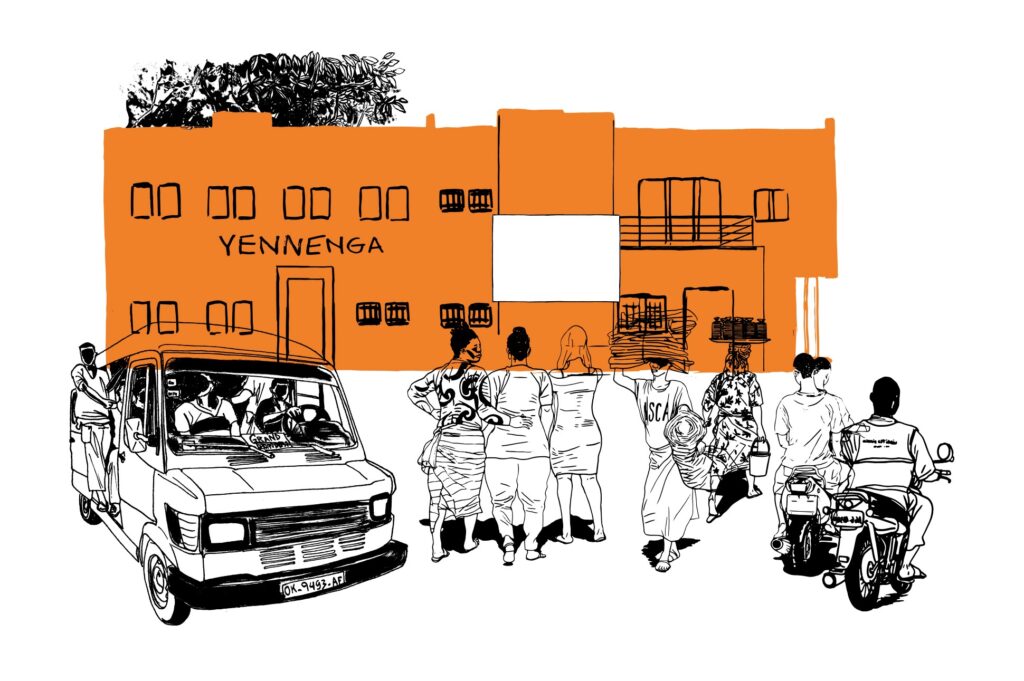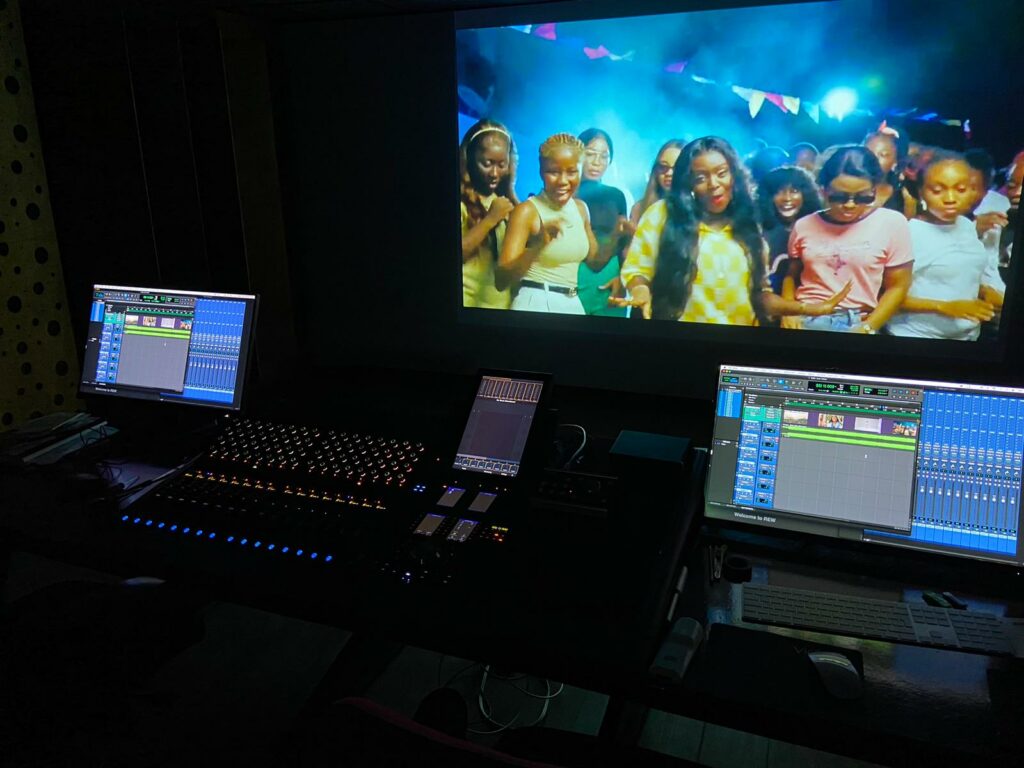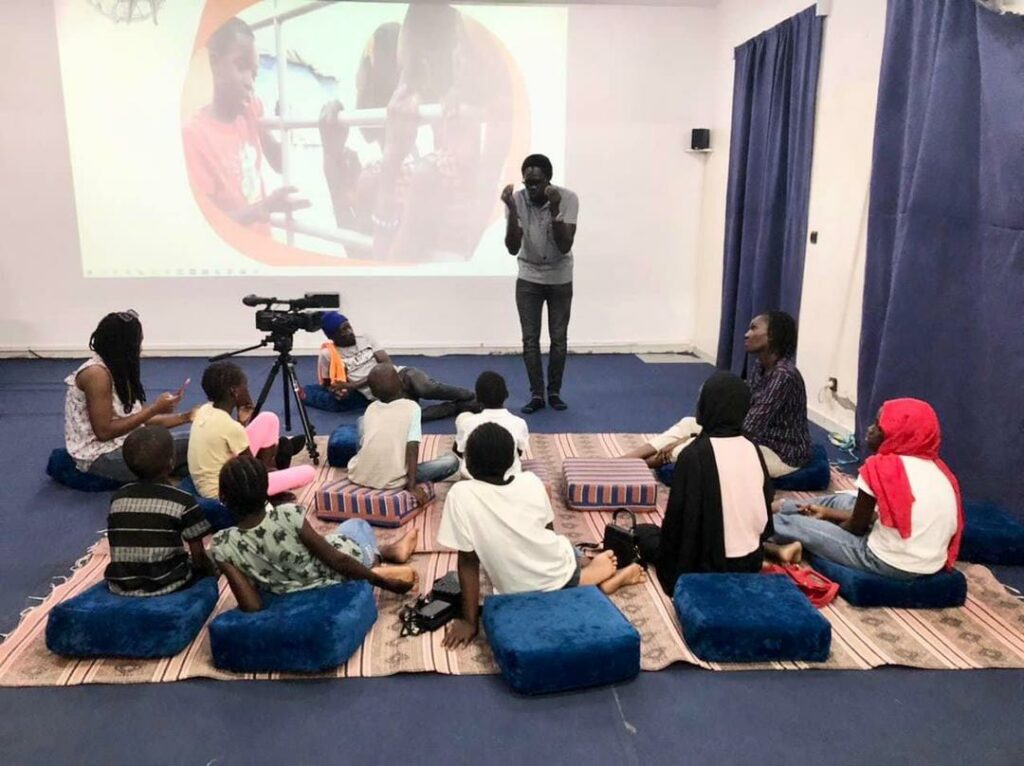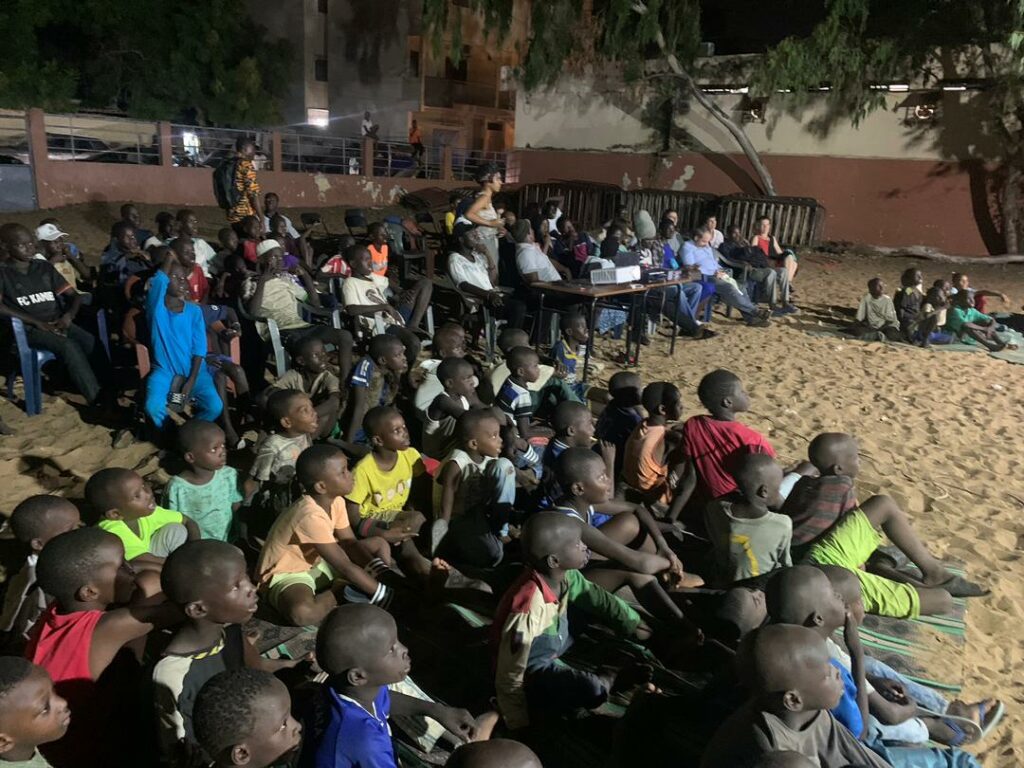We want to make people cinemagoers again
Interview with Ibee Ndaw and Sara Gadiaga, Yennenga Centre
Yennenga Centre is a hub dedicated to film education, creation, and film programming, based in Dakar, Senegal. Among a broad program, they present films exploring social issues, aimed at diverse audiences, with a special emphasis on the younger generation. They also offer training programmes in post-production, editing and colour grading, as part of an overall goal to support African domestic film production.
Yennenga Centre chose Le Mouton de Sada to present as part of the Cinema of Commoning Film Program. Ahead of the screening on Wednesday 10 April at SiNEMA TRANSTOPIA, we spoke to Ibee Ndaw and Sara Gadiaga from the team about film education, the power of collective viewing and why we should all be cinema goers.

Introduce us to Yennenga Centre – how would you describe the cinema to someone who has never visited? What is special about your cinema?
Ibee Ndaw: Yennenga Centre was founded by Alain Gomis to address the lack of post-production facilities in West Africa and in Africa in general. Typically, post-production constitutes around 30% of a film’s overall budget. However, when you make films in Africa, the proportion of budget spent on post-production can rise up to 70% for multiple reasons. You have to travel, or the fees that you have to pay when sending your film for post-production in the Global North are completely different to the economies of Global South countries. The idea was to have a place with international-level facilities, where people can do post-production, but then you also need people to be trained as technicians, who can do the editing, the sound, the color grading, etc. Other places do exist as post-production facilities, but they do not have the expertise needed to make films for cinema, which is what we are trying to do. It’s also important for us to train young people in the latest techniques, because although you can find some trained practitioners in post-production, they are using much older techniques.
At Yennenga Centre we specialize in post-production and training programs, along with cultural programming. We are situated in a very particular place, in the middle of Grand Dakar, which is geographically close to the center of Dakar, but it’s not the center. It’s a more rural and blue-collar neighborhood, and as Alain comes from this neighborhood, he wanted to give back to this community. Every Friday, we host film screenings – from shorts to animation, to fiction and to documentary. Our screenings are free-of-charge and open to the community. We also want to be a place open to collaborations, welcoming initiatives from local non-profit organizations as long as they align with our focus on cinema and film.

You’ve already mentioned your training initiatives, which are a big part of what you do. In a wider sense, why is film education so central to your work – and how does Yennenga Centre work to increase access to cinema amongst young audiences?
Ibee: We don’t train filmmakers, what we focus on is post-production, the phase just before distribution and circulation, which is currently underdeveloped in West Africa. Although post-production is happening in Morocco or in South Africa, it’s harder to find in other places, because these facilities require huge investment. During the past few years in Senegal, more cinema schools have emerged, so there’s a school for screenwriters, for actors, for techniques like camera and sound. But the field of post-production remains overlooked
We offer free post-production training open to all. Most of our students are from Senegal, but we also have people coming from Burkina Faso, Benin, Mali, DR Congo, Mauritania… Our only requirement is that they have to speak French, because that’s the language the training takes place in. We also prioritize gender balance, aiming to have an equal number of men and women. We have been running this program for two years and now for the third year we have a small group of trainees that are developing hands-on skills by working on their film projects.
Sara Gadiaga: We also have this program called Ciné Xalé ( Xalé means “child” in Wolof), which aims to train the views of filmmakers of tomorrow by addressing the decline in cinema attendance. When most countries began gaining their independence in the 1960s, numerous theaters began to close in West Africa because people were not going to movies anymore. We want to make people cinemagoers again. Nowadays people watch films on their phone or on TV, but we wanted to explore how to keep people interested in the collective experience of watching films together in the cinema. With Ciné Xalé, we are bringing films to the kids through multiple activities. We organize a weekly CineClub, where kids come and watch a short film, and they discover different aspects of what filmmaking is. They meet the filmmaker, they meet people working within sound, post-production, distribution.
We also have partnerships with schools, where we go and show films. We want to bridge the gap in access to cinema experiences by bringing films directly to them, because people cannot always afford the luxury of going to the cinema, especially if they are a big family. Our goal is to foster a lasting interest and appreciation for cinema among the youth, nurturing a new generation of cinephiles and filmmakers.

How do you think that Yennenga Centre can serve as a space for community building and placemaking – how do you do this practically, taking into account the political context of Senegal today?
Sara: Our neighborhood is a crowded area, and just as with the rest of the continent there’s lots of young people. The idea was to have free public screenings, preferably outdoors, not always in the center, because some people from the neighborhood do not want to go that far. Mainly we programme African and pan-African cinema, with a high percentage of Senegalese films in Wolof, because some people cannot read or read in French. Having films in Wolof helps more people feel like this is a place they can come, that this is a place for them. We also like to have films from other spaces which speak to issues which connect with our audiences, such as films from Haiti, which might be from a different place but which depict the same struggles that we can relate to. We want to encourage the community to be invested.
Every one of our screenings ends with a conversation, sometimes with the filmmaker but not necessarily, sometimes just with us, and it just provides a space where people can exchange ideas, disagree or just meet and discuss.
Ibee: There are a lot of Cine Clubs also which we work with, and it’s not just inviting them but it’s also going to what they do, attending their screenings, being invested if they need support, if they need equipment. We also work with non-profit organizations which can be completely outside the cinema, people from the neighborhood, who we invite to the screenings so they can discover what we do and discover that this is a place where they can come in. When we do outside screenings it’s really easy, everyone comes. Now it’s a bit chilly, we are not doing outside screenings, so people come in and think “Oh this is a cultural space, do I belong, can I go in?” So it’s also all that work we do which is like “Please! Come come come!”
The political aspect has impacted us. A number of times with Ciné Xalé there were supposed to be an outside event, but due to security issues Sara and the team had to decide in the moment not to do it, because we were not sure how it would end. The only option was to cancel and ask people to stay at home. At the end of the year, when the election was going to be postponed, there were demonstrations planned on screening days. We had this huge conversation about what we should do. Should we have the screening so we can allow everybody that wants to, to go and demonstrate? Should we put everything online so it can also go to a broader community? What kind of films could we screen? We had a whole programme about revolution. Actually things unfolded and the election did happen in time, but we still have all these films ready to screen. We were ready to go bold, and to screen these films.
Ibee: Thinking of community, one initiative of Sara’s which I would like to mention is something we have been doing across the month of Ramadan. Senegal is majority Muslim so Ramadan is huge, everyone is fasting and feasting. So we had this slight change to our weekly meeting, in which we are inviting people to break the fast together, and then watch a film. It can be any random film, but we have people come and we have half an hour just before the film to break the fast together and we offer food. We’ve seen people that do not come the rest of the time, they come and they stay. We’ve been doing this every Friday for a month for the whole month. And tomorrow if everything goes well, we will also be having a solidarity screening night with Palestine. We are going completely out of pan African cinema, but we feel strongly that we want to express solidarity between the Black and Palestinian struggle for freedom.
You are screening Le Mouton de Sada with us at SiNEMA TRANSTOPIA as part of our Cinema of Commoning collaborative film programme – can you talk to us a little bit about why you chose the film?
Sara: Le Mouton de Sada is one of the first films in recent history which was A-Z completely made in Senegal. As we said earlier, our wish for the Centre was to provide the possibility of making a film completely, from development to circulation, in West Africa. This film, by Pape Bouname Lopy does that because he is a Senegalese person, he has been working with a Senegalese production, then the film was completely post produced, from editing to export, in the Yennenga Centre. It also has a Senegalese distributor. For us it was really just an incredible example of our pride of being part of this. It is also a film that is very strongly connected to our reality in Senegal and in Dakar, especially as it focuses on this event of the Tabaski [an Islamic festival which includes the ritual slaughter of a ram] which is an important ritual for the Muslim majority in Senegal. This film is also the first feature coming out of this non profit which is training a new generation of cinema technicians, so we felt this was a perfect way of showing what it is that we do, not just on the programming side, but also in terms of supporting Senegalese cinema today.
Ibee: Le Mouton de Sada, is the story of this cultural event, but also of this family being torn apart, and this is a story that has happened to so many Senegalese families! On the day of Tabaski the child is like, “What are you doing with my friend? This is not happening!” And the family are like, “okay this kid has been crying for two days, bring me another sheep.” I feel like I could watch this film in China, or in Colombia, and the audience would be like “yes, I understand this.” It’s about a family getting back together and it’s also about the social pressure of society.

What does Cinema of Commoning mean to you?
Sara: The Cinema of Commoning is a beautiful program which provides a space where different places in different parts of the world can encounter and discover each other’s reality within the cinema work that we are doing. We can discover what it is to have a cinema working across these different countries and discover the social and economic reality. Through this encounter and sharing this program, we can also maybe connect again in the future, supporting each other in other aspects and this is what keeps a global cinema connected to each other and not isolated in one territory.
Ibee: For me, Cinema of Commoning, in a more philosophical sense, is about having places which are not necessarily theatrical in the traditional sense of the term, but places which are trying to create the cinema experience for people. Different places which all have this in common, this desire to reach different audiences, to bring them cinema that they love; to have this opportunity to connect through the work of the filmmakers that we love.
Ibee Ndaw was born in Gambia and graduated from the University Paris 3-Sorbonne Nouvelle (MA in Film Studies) and from University Paris-Est-Créteil-Val-de-Marne. From 2019-2022 she held the position of Distribution Assistant and later Festival Manager at Sudu Connexion, while also running cinema workshops in elementary schools. In 2022, she joined the programming and organizing office of the Seytou Africa, Documentary Film Festival. In 2023, she served as a reader and translator for South African production companies (Big World Cinema, STEPS) and participated in Durban FilmMart where she evaluated feature projects. Additionally, she undertook the coordination of the second Pan-African edition of the Mobile Film Festival Africa held in Morocco. Since September 2023, she is the new coordinator of the Yennenga Centre. Ibee is also a programmer at Durban International Film Festival and an alumni of the Realness Institute.
Sara Gadiaga is a Senegalese director and photographer, born in Diourbel in 1997. He holds a degree in Computer Science and Management, but developed an early interest in cinema and in 2019, he joined the collective Ciné Banlieue to continue his cinema studies. Since 2020, he has assisted in the making of several shorts, features, television series and videos. After obtaining his Baccalaureate, he acquired varied experience, training in screenwriting at the Cinematography Department (DCI) and in archives. At Yennenga Centre, Sara has worked on various cultural projects. He was in charge of programming at Cine Suburbs in 2022, then held the position of Head of Programming and Cultural Meditation, while coordinating Ciné Xalé, an educational cinema project for children. In 2023, he represented Yennenga Centre at the Film Market of the Clermont-Ferrand Festival, in France.